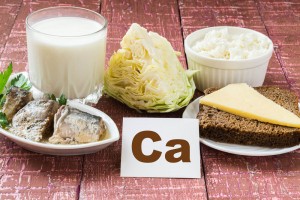How do I know my blood level of calcium and vitamin D?
How much calcium do I need daily?
What happens in case of improper use of calcium?
Is overdose with calcium possible?
How is a lack of calcium manifested?
What should and what should not I eat?
I have lactose intolerance and I am on a diet without dairy products. What can I do about it?
Can osteoporosis be prevented by use of calcium in combination with vitamin D3 and K2?
Why is it better to use calcium separately from vitamin D3?
Why calcium does not work without vitamin D3?
What decreases calcium utilization?
Is it sufficient to get vitamin D just from the sunshine?
I am a vegetarian and I’m thinking to stop eating all animal products. How can I ensure proper calcium intake?
Why do women need more calcium than men?
Why do I need also vitamin K2?
Why is vitamin K2 considered to be a miracle vitamin?
Didn’t you find the answer for your question?
Why should I use calcium supplements?
Calcium is the basic building component of bones, but it also plays an important role in the activity of the heart, muscles, nerves, and blood coagulation. If the level of calcium in blood decreases, the body uses calcium from bones. The bone serves as a reservoir of calcium, from which the body can use calcium, if it is necessary. This might lead to more porous bones that are brittle and there is a higher risk of fractures. The result of this is osteoporosis. It is therefore extremely important to supplement the natural calcium in the right amount on daily basis
How do I know my blood level of calcium and vitamin D?
The levels of calcium and vitamin D can be measured by blood test at the office of your general practitioner, internist, endocrinologist, rheumatologist or osteologist. If you are already taking nutritional supplements, tell your doctor about it.
How much calcium do I need daily?
The daily recommended dose of calcium depends on age, gender and other factors. Higher dose is needed in pregnancy, during breast-feeding, in menopausal age or in case of fracture. Children and adolescents should take from 400 mg to 1,200 mg and from 1,200 mg to 1,500 mg of calcium daily, respectively. A daily recommended dose of calcium for an adult is between 1,000 mg and 1,500 mg. You can find an overview of daily recommended doses of calcium in the section „How much calcium do I need?“.
What happens in case of improper calcium use?
When there is a calcium deficiency, the body takes calcium from the bones in order to ensure proper function of important calcium-dependent body processes. This leads to increased brittleness of the bones. In addition to weakened bones, or development of osteoporosis, calcium deficiency can be reflected on our teeth, skin, hair, nails, cardiovascular system, muscles, but also menstruation. It is however insufficient to take just calcium because the body is not able to properly utilize calcium alone. It is advisable to take the vitamins D3 and K2 along with calcium. On the other hand, an excessive use of calcium can lead to overdose, which is usually rare and not dramatic.
Is overdose with calcium possible?
Calcium overdose is possible, but it is also very rare. You need to take substantialy higher dose of calcium than is the recommended daily dose. If this happens, there is no need to worry. But you may experience constipation, anorexia, vomiting, headache, thirst and decreased nerve excitability. If you accidentally took a dose higher than the recommended daily dose, you should consult your condition with your doctor.
How is a lack of calcium manifested?
When there is a calcium deficiency, the body takes calcium from the bones in order to ensure proper functioning of important calcium-dependent body processes. This leads to increased brittleness of the bones. In addition to weakened bones, or development of osteoporosis, calcium deficiency can be reflected on our teeth, skin, hair, nails, cardiovascular system, muscles, but also menstruation.
Prolonged calcium deficiency in children may cause impaired formation and growth of bones and teeth, dental caries, impaired growth, lower growth compared to peers, and rickets. Calcium deficiency in adults may present as osteomalacia (softening of the bones), osteoporosis (thinning of the bones), periodontitis (released teeth), dental caries, palpitations, insomnia, muscle jerks, cramps and muscle pain, cold sores and blisters in mouth, eczema, brittle nails, increased hair loss, excessive menstrual bleeding, worsening of the symptoms of premenstrual syndrome or teeth grinding.
What should and what should not I eat?
A diet in children and adults should be balanced, as the body needs to get daily amount of minerals and vitamins, which are needed for proper functioning of the body. To ensure correct levels of calcium in the body, it is necessary to include calcium rich substances in our diet. Although calcium is present in all food ingredients, it is not easy to find those substances that contain enough calcium. The most important source of calcium is milk and dairy products rich in calcium but also some plants such as poppy seeds, hazelnuts, walnuts, and soybeans and also some mineral waters. In general, however, the usefulness of calcium from plant sources is lower, as it is in a form which cannot be sufficiently used by the body. The food high in phosphorus and fiber should be excluded from our diet and it is inappropriate to consume excessive amount of caffeinated drinks, coke and alcohol. We should rather consume hard, soft unripened cheese or cottage cheese spreads instead of processed cheese. Body can utilize more than 50% of calcium from vegetables such as cauliflower, broccoli, kale, Brussels sprouts, cabbage, Beijing cabbage, Chinese cabbage, watercress, turnips and kohlrabi. The body can extract calcium from food in a higher amount if it is taken in several portions than just from one single portion. We have to be careful in case of certain diets as the food might be rich of calcium but it may lack the ingredients that are needed for calcium utilization in the body. The level of calcium in the body is reduced by drinking alcohol and smoking.
I have lactose intolerance and I am on a diet without dairy products. What can I do about it?
Constantly, there is an increasing number of allergies and different intolerances in children and adults. In case of allergy to a cow’s milk protein, it is necessary to exclude a milk and dairy products from a diet and replace them with other sources of calcium. Similar situation exists in case of lactose intolerance, although in this case, people usually tolerate dairy products such as yoghurts, fermented cheese and milk without lactose, which do not cause the problems. However, if such substitution is not possible, it is necessary to find different alternatives. Poppy seeds, hazelnuts, walnuts, soybeans and also some mineral waters are rich in calcium. In case of difficulties with including other sources of calcium, such as milk and diary products, in a diet, it is appropriate to replace the daily dose of calcium with nutritional supplements.
Is it possible to prevent osteoporosis by taking calcium in combination with vitamins K2 and D3?
Yes, it is possible, but the right timing of their use is similarly important. The processes of storing calcium in the body occur mostly in childhood and adolescence, and no later than in the 25th to 35th year of life. The intake of calcium in these ages is therefore very important. Women before menopause should take calcium in combination with vitamin K2 and D3 on daily basis in order to prevent osteoporosis, or mitigate complications of osteoporosis. Calcium gets exactly there where it is needed – to the bones, thanks to vitamin K2 and D3.
Why is it better to use calcium separately from vitamin D3?
Vitamin D3 is a fat-soluble vitamin, which means that it is appropriate to take some fat when vitamin D3 is taken. However fat and calcium chemically interact and they produce insoluble calcium soaps, which the body can not utilize and thus calcium is eliminated from the body without use. Thus calcium should not be taken together with meals with high content of fat. In case of vitamin D3 intake such meals are however desirable. Ideally, we should take vitamin D3 and calcium at least 2-3 hours apart.
Why calcium does not work without vitamin D3?
We are not able to absorb calcium from food or nutritional supplements. Calcium absorption occurs in the small intestine with help of vitamin D. The process of calcium absorption is influenced by several factors and while vitamin D promotes calcium absorption into the blood, a number of other substances, on the contrary, reduce calcium absorption.
What decreases calcium utilization?
The biggest “enemy” of calcium is wrong food combination. You should know about following principles:
- The fibre reduces calcium absorption.
- Coke drinks contain phosphorus and they produce insoluble salts in our bodies. We should take maximum of 500 to 1,000 mg of phosphorus daily. Drinking of coke drinks should be completely omitted in children.
- Oxalates and phytates, which are in plant foods, form insoluble salts with calcium.
- Pay attention to fats! Fats form soaps with calcium in the small intestine!
- You should not use calcium and magnesium together because magnesium decreases calcium absorption.
- Do not use salt in an excessive amount! The salt, it means sodium increases the excretion of calcium.
Is it sufficient to get vitamin D just from sunshine?
We get nearly 90% of vitamin D through photochemical reaction by sunlight and only remaining 10% of vitamin D we get from food. The vitamin D is not formed if you use sun protection factor greater than 8 before getting at the sun. It is because vitamin D can be formed in the skin, by photochemical reaction, only by direct sunlight exposure. Sunscreen with a factor of 8 reduces a production of vitamin D up to 95% and if the sunscreen factor is 15, the production of vitamin D is decreased to almost zero. So we are able to be tanned and unburned but with not getting enough vitamin D. According to a study published in the Journal of Clinical Endocrinology and Metabolism, 59% of the population have vitamin D deficiency and 25% of people have extremely low levels of vitamin D. If we would like to get our daily dose of vitamin D, we would have to be in the sun without use of sunscreen at least 20 minutes per day, three days a week. Smog might lower the sun exposition and thus the level of vitamin D. The women should be aware of the fact that most make-ups have SPF 20+, and thus the skin is protected against aging due to the sunlight, but it also does not form the vitamin D. Age and amount of pigment also play an important role in the possibility of vitamind D production. Older people have reduced capacity to absorb vitamin D during their stay at the sun, and similar situation exists in case of people with naturally higher skin pigmentation.
I am a vegetarian and I’m thinking to stop eating all animal products. How can I ensure proper calcium intake?
To ensure an adequate supply of calcium for any child is indeed complicated, but not impossible. We just have to learn how to properly combine the foods in a diet.
- Eat green leafy vegetables, preferably uncooked, every day.
- Excellent source of calcium are poppy seeds. One hundred grams of poppy seeds contain up to 122% of the recommended daily dose of calcium.
- CHIA seeds contain 5 times more calcium compared to milk. One hundred grams of CHIA seeds contain 600 mg of calcium.
- Add nuts (almonds, walnuts, hazelnuts) into your diet and soak them before consumption.
- Vegetable milks are usually fortified, it means that they are enriched by vitamins. If you can, choose them.
- Do not forget to eat legumes. Soy and beans have high content of calcium.
- If you are not vegan, do not forget to add sour milk products and milk into your diet.
Why do women need more calcium than men?
Under normal circumstances, daily intake of calcium in women should be the same as it is in men. However, there are certain periods in life of women with increased demand on their bodies. Such periods of life are pregnancy and breastfeeding. In these periods of life previous recommended daily dose of calcium is not sufficient because a child needs necessary vitamins and minerals for growth and development. The child takes necessary vitamins and minerals from the mother through the placenta or breast milk. It is thus logical, that woman should increase daily intake of calcium in these periods of life. Similar situation is in the menopause, when the body of the woman goes through significant hormonal changes. Following the loss of female hormones, calcium drains away in a large amount from the bones.
Why do I need also vitamin K2?
Even adequate amount of calcium in the body cannot be properly utilized without vitamin K2 and D3. Vitamin K2 and D3 direct calcium into the bones and teeth, where calcium is needed and thus calcium does not deposit in the blood vessels and tissues. The bones in the human body are in constant change, constantly created and disrupted. Osteocalcin is capable of binding calcium and put it in the right place only in the presence of sufficient amount of vitamin K2, which activates osteocalcin. It is believed that another important role of vitamin K2 is cancer prevention and the activation of proteins that control cell growth in the body. Such studies have not been completed yet. It is difficult to get vitamin K2 from the a as it is made up only by certain types of fermentation bacteria.
Why is a natural calcium OVOVITAL®, of the company Biomin, different?
Natural calcium produced by Biomin company is the only one that is made from eggshell. It is a pure natural calcium, free of chemicals and excipients, therefore, even in a long-term use it is not harmufl for the body. Did you know that 30% more of natural calcium than syntetic calcium can be absorbed? Calcium of Biomin company is produced even in micronized form. Micronized calcium is ideal for our body, as the particles are small enough to get through the small intestine into the whole organism. Calcium is packed into hard gelatine capsules without the use of excipients. Nutritional supplements of Biomin H company are produced in a quality of medicinal drugs an content of capsules is guaranteed and controlled during the whole manufacturing process.
If you take calcium in combination with vitamin K2 and vitamin D3, calcium gets exactly where it is needed and where it can be utilized by the body.
Why is vitamin K2 considered to be a miracle vitamin?
It was not known how important vitamin K2 was when it was discovered. And it has became the subject of research only recently. Vitamin K2 is a fat-soluble vitamin that, most likely, helps to maintain healthy bones and cardiovascular system. Thanks to vitamin K2, calcium is directed to the bones and teeth, where it is needed and it does not deposit in the blood vessels and tissues. Another anticipated major role of vitamin K2 is cancer prevention and activation of the proteins that control cell growth in the body. Many people consider these information as a breaking news.











